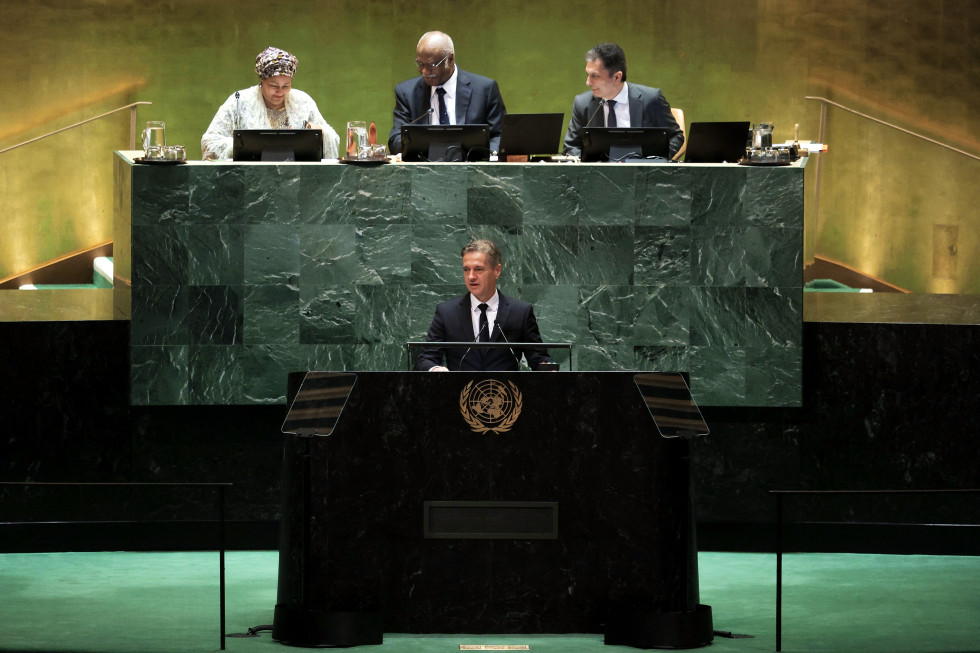Prime Minister Golob calls for end to war and occupation in emotional address at the UN General Assembly
In his opening remarks, the Prime Minister called attention to the Pact for the Future adopted a few days ago, which was a rare flicker of unity in these times of wars, climate catastrophes, increasing inequalities and deepening polarisation. The Security Council unanimously adopted the Presidential Statement which, according to the Prime Minister, was a good start that would re-energise the efforts of the global community for a better, more peaceful and more humane world.
The Prime Minister expressed full support and enormous respect for Secretary-General António Guterres. He warned, however, that the Security Council was unable to respond in an effective way to major conflicts, such as in Gaza, Ukraine and Sudan.
In this regard, Prime Minister Golob stressed the responsibility of the permanent members of the Security Council. "By misusing the veto and putting national interests first, they have effectively blocked the workings of the UN Security Council. We should put our common interests first. And the world would be a better place," said the Prime Minister, calling attention to the aggression in Ukraine, the war in Gaza, the situation in the West Bank, East Jerusalem and Lebanon and the humanitarian catastrophe in Sudan.
He also touched upon the reform of the Security Council. "Our experience in the Security Council has given us renewed appreciation for the need to reform the Security Council. We urgently need a Council that is a true representation of the international community. A Council that is fit for the world of today. We need to ensure that the distribution of seats is fair," said the Prime Minister, adding: "The Council needs stronger voices from the regions that have been underrepresented, such as the African continent."
In his speech, Prime Minister Golob commended the work of humanitarian workers on the ground, in armed conflicts, among the civilians representing the face of the United Nations. "The erosion of respect for international humanitarian law is making their work so much more difficult. The Gaza conflict was, however, a turning point. In Gaza, humanitarian workers are not just occasional collateral victims but seem to have become a deliberate military target," added the Prime Minister.
In his speech, the Prime Minister also addressed the issue of climate change. "Extreme weather events are multiplying water-related risks across the world. This global challenge demands a global and collaborative response. Solutions exist but are not equally accessible to everybody," he warned. "As the catastrophic floods devastated my country last year, we initiated the development of an advanced digital solution linking earth observation with supercomputing and artificial intelligence. The system will help us predict floods and droughts and improve our resilience. We are ready to share this solution with our partners," said the Prime Minister.
He therefore called for a global partnership to be established within the early warning system. "Such a partnership would boost our common preparedness and ensure that everyone on Earth is protected from hazardous weather, water, and climate events through life-saving early warning systems." Slovenia decided to take the initiative and launched the Global Alliance to Spare Water from Armed Conflict together with a regional group of countries. Such global partnerships are urgently needed to safeguard the human right to water for all," said the Prime Minister.
In his closing remarks, the Prime Minister highlighted the importance of humanity. He stressed the need to ensure that people around the world age with dignity, adding that we should delay no further in addressing the main issues related to gender equality, including the future development and implementation of the Women, Peace and Security Agenda. "The UN should lead by example when it comes to the full, equal and meaningful role and leadership of women in our societies," said Prime Minister Golob. "In its entire history, the General Assembly has been led by only four women. We have never had a female UN Secretary-General. The time has come for gender equality to be reflected in the top leadership positions of this organisation."
He stressed that children are always the most vulnerable in times of crisis. "Today's world is increasingly hostile to children's rights. More children than ever are experiencing violence in all settings, many have lost their lives, are forcibly displaced, exposed to the most traumatic experiences, imprisoned, denied education and healthcare, and face extreme poverty and social exclusion," said the Prime Minister. He cited Gaza as an example of the extreme suffering of children, adding that Slovenia is offering concrete help with the Foundation "Let them dream", which deals with the rehabilitation of children from Gaza.
"It is an extremely noble and human project, which was launched years ago and has already helped hundreds of children from Gaza who have undergone rehabilitation in Slovenia and will continue to do so. Sadly, some of these kids are victims of recent aggression in Gaza," he said.
He shared the story of two young girls, Sara and Rand, from Palestine, whom he met at a Save the Children event earlier this week. Despite the destruction, dehumanisation and fear, there was no anger or hate in their stories. They just have this enormous wish to live a normal, decent life.
"Today, I am fulfilling my promise to them by bringing their story to the General Assembly. It is only with a united stance for peace and against the war that we will ensure that Sara and Rand and all other children in Palestine and around the world are not among the thousands of missing futures of children under occupation," he said.
"I want to say this loud and clear to the Israeli government. Stop the bloodshed. Stop the suffering. Bring the hostages home and end the occupation. Mr Netanyahu, stop this war now!" said Prime Minister Golob.
Additional content from the session
-
- Address of PM Robert Golob (docx, 38 KB)


